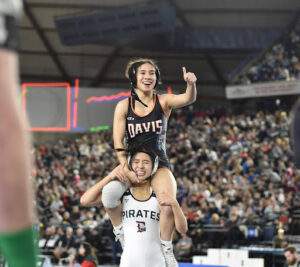HIGH SCHOOL BURNOUTS – BY GRACIE PHAM, DAVIS (’24)
 Statistics show that a little over 7% of high school athletes continue to play at the college level of athletics after high school. With about 8 million high schoolers participating in sports throughout the United States, the amount of opportunities there are available to those who are interested in continuing their careers past high school is limited. Even disregarding scholarship availability, the chance to compete at the college level even in small community colleges can give athletes the chance to create relationships and memories with people that they’ll carry on through the rest of their lives. But why is it that such a small percentage of high school teenagers don’t move on to the college level once they graduate?
Statistics show that a little over 7% of high school athletes continue to play at the college level of athletics after high school. With about 8 million high schoolers participating in sports throughout the United States, the amount of opportunities there are available to those who are interested in continuing their careers past high school is limited. Even disregarding scholarship availability, the chance to compete at the college level even in small community colleges can give athletes the chance to create relationships and memories with people that they’ll carry on through the rest of their lives. But why is it that such a small percentage of high school teenagers don’t move on to the college level once they graduate?
While there are many reasons as to why, I want to discuss specifically the issue of young adolescents feeling burnt out from their sports before they even get the chance to enjoy that chapter of their life. I’ll be focusing on specifically the perspective of wrestling, since that is the sport that I am connected to. I live in a valley that is more or less a breeding ground for wrestlers. Between the hundreds of little kid club teams that eventually feed into the high school programs, there is never a lack of stud athletes that pop up out of our schools, and the amount of talent that actually does come out of the area is just remarkable. As I grew up around some of the biggest names in Washington, out of all the wrestling champions that come out on top, I only ever see a handful even consider wrestling in college, even being 2 or 3 time State Champions. But at the same time, I see people who hardly placed in the high school State level continue to compete in the college level. Why is there this imbalance?
I see it every day having experienced training in different wrestling rooms throughout the state, wrestling with novice and elite, nationally ranked wrestlers. What’s hard about playing sports from a young age is that by the time they reach the high school level, some kids would have wrestled 10, 12 years of their life. Between the amount of work it takes to balance social life and school, as well as an athletic career, it’s just crazy to place those expectations on a teenage kid, let alone an 8-year-old who is still figuring out how to multiply. A trend you’ll see when you walk into tournaments during the kids’ wrestling season is that there will be hundreds of young kids ranging from ages 6-10 years old, stacking the brackets with wrestlers, but as soon as you reach 13-14-year-olds in middle school, the amount of kids in the brackets drops drastically.
What’s sad about this reality is that it’s inevitable that kids will fall out of love in a sport, or find new hobbies to pursue later on in life. But I’ve seen countless, big-named athletes who were the talk of the valley growing up, and then completely fell out during their high school season. And regardless of talent, seeing people losing the love in a sport that they grew up doing hurts, in the fact that the memories they would have, or could have made, ended within the pressure that they feel as young adolescents. What I believe isn’t stressed enough in high school, or even middle school, is that they believe that the end of the story is making it to State in high school, or winning multiple State Titles, where it should be about wrestling to find yourself, and become better every day. Find your reason to wrestle, because there should not be any pressure to do more than the best that you can. If all you’re doing is something that you love, no athlete would be working a day in their life. In doing something that you enjoy, I believe more athletes would be open to the opportunities of wrestling at the college level, or at least consider the possibilities of continuing a hobby that they love doing.
While I understand that this isn’t the case for all athletes, I believe it’s something that should be talked about at any level. To build a relationship, you have to nurture and care for it; it can’t grow with pure bruteness and training. Learning to love a sport like wrestling is hard, but it’s not impossible… I can say that from personal experience.



